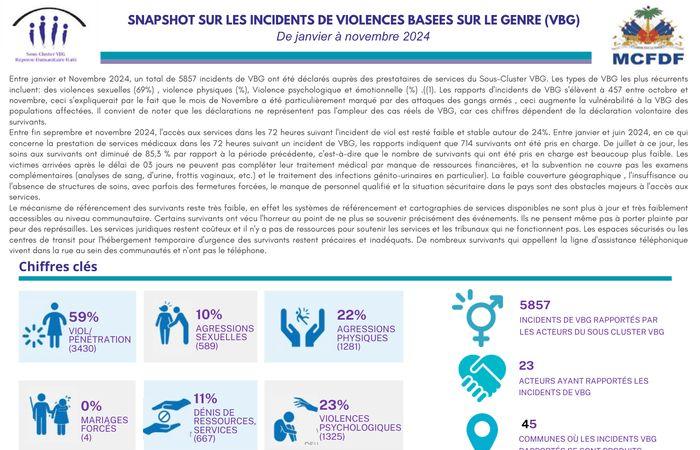
Between January and November 2024, a total of 5,857 incidents of GBV were reported to service providers in the GBV Sub-Cluster. The most recurring types of GBV include: sexual violence (69%), physical violence (%), psychological and emotional violence (%). ((1). Reports of GBV incidents totaled 457 between October and November, this could be explained by the fact that the month of November was particularly marked by attacks by armed gangs, this increases the vulnerability to GBV of the affected populations. It should be noted that the declarations do not represent the magnitude. cases actual GBV occurrences, as these figures depend on the voluntary declaration of survivors.
Between the end of September and November 2024, access to services within 72 hours of the rape incident remained low and stable at around 24%. Between January and June 2024, regarding the provision of medical services within 72 hours of a GBV incident, reports indicate that 714 survivors were supported. From July to date, survivorship care has decreased by 85.3% compared to the previous period, meaning the number of survivors who have been supported is much lower. Victims who arrive after the 03-day deadline cannot complete their medical treatment due to lack of financial resources, and the subsidy does not cover additional examinations (blood tests, urine tests, vaginal smears, etc.) and treatment of genitourinary infections in particular). The low geographic coverage, the insufficiency or absence of healthcare structures, sometimes with forced closures, the lack of qualified personnel and the security situation in the country are major obstacles to access to services.
The referral mechanism for survivors remains very weak, in fact the referral systems and maps of available services are no longer up to date and very poorly accessible at the community level. Some survivors experienced horror to the point of no longer remembering the events precisely. They don’t even think about filing a complaint for fear of reprisals. Legal services remain expensive and there are no resources to support services and courts that are not functioning. Safe spaces or transit centers for emergency temporary accommodation of survivors remain precarious and inadequate. Many survivors who call the helpline live on the streets in communities and do not have telephones.
Canada





